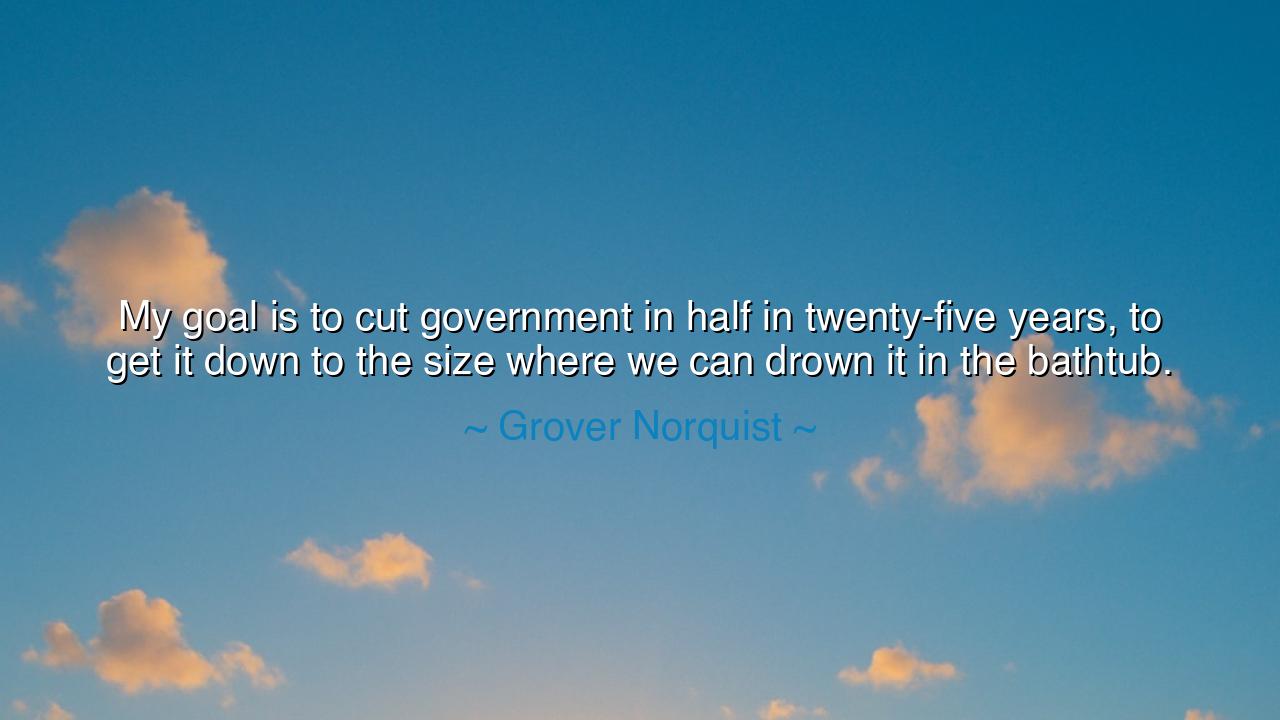
My goal is to cut government in half in twenty-five years, to get
My goal is to cut government in half in twenty-five years, to get it down to the size where we can drown it in the bathtub.






"My goal is to cut government in half in twenty-five years, to get it down to the size where we can drown it in the bathtub." Thus spoke Grover Norquist, the fierce prophet of small government, whose words echoed like a thunderclap through the chambers of modern politics. At first hearing, his declaration may seem harsh, even cruel — yet beneath its sharpness lies a philosophy as old as liberty itself: that power, like water, must be contained, or it will flood the land and drown the freedom it was meant to protect. His words are not the call of a destroyer, but the warning of a sentinel — one who has seen what happens when government, grown vast and unrestrained, devours the life of the nation it was sworn to serve.
Norquist’s vision was born in the waning years of the twentieth century, in an age when government had swelled beyond its original bounds. To him, the state had become not a servant, but a master — a creature of endless appetite, feeding on taxes, debt, and dependency. His “bathtub” was a symbol, a metaphor for the discipline that liberty demands: that the power of the state must be reduced until it is no longer capable of suffocating the vigor of free men and women. He sought to remind his generation that a government too large to fail is also too large to be free. For as the ancients knew, what begins as protection often ends as domination.
The meaning of Norquist’s words reaches beyond politics and into the moral order of civilization. Every people, in every age, must decide how much authority they will surrender in the name of safety, and how much freedom they will risk in the name of dignity. To Norquist, the balance had tipped too far; the state had become a machine that punished success and rewarded dependence. His desire to “cut government in half” was not an act of cruelty, but an act of restoration — a call to reclaim responsibility for one’s own life, one’s own choices, and one’s own destiny. For when citizens forget how to live without government’s hand, they cease to be citizens and become subjects.
History gives many examples of the truth he saw. In ancient Rome, the republic that once stood as a beacon of virtue and self-rule fell into decadence when its people demanded that the state provide all things — bread, games, and comfort. The senators, eager to please, taxed and borrowed until corruption became the air Rome breathed. In time, liberty was drowned in its own prosperity, and the Caesars rose in the name of order. So too, Norquist warned, could modern societies perish — not by invasion or rebellion, but by the slow and quiet surrender of freedom to the comforting embrace of bureaucracy.
Yet his warning was not a hymn to anarchy. He did not call for the destruction of all government, but for its purification. Just as the farmer prunes the tree so that it may grow stronger, so too must a free people trim the state so that it may serve rather than smother. Norquist believed in the virtue of self-reliance, in the power of communities, families, and faith to care for their own without the distant hand of centralized control. He saw that the spirit of a nation cannot thrive on dependency — that every law and every regulation, though perhaps well-meaning, carries the risk of chaining the soul of the individual.
The power of Norquist’s statement lies in its imagery — to “drown it in the bathtub” — a vivid, almost violent metaphor for the final act of subduing an overgrown force. It is not the drowning of justice or compassion he seeks, but of waste, corruption, and coercion. The bathtub represents the boundaries within which government must remain confined: small enough to be managed, transparent enough to be seen, and restrained enough to leave room for the flourishing of private life. For just as fire warms when contained and destroys when uncontrolled, so government, in its proper measure, preserves liberty — but when it grows too large, it consumes it.
The lesson that flows from his words is as ancient as the story of every fallen empire: liberty is not the natural state of humanity — it must be guarded and renewed with every generation. The people must not seek salvation in the state, but in their own virtue and labor. Let the government do only what individuals cannot do for themselves, and let the people reclaim the rest through courage, charity, and wisdom. This balance — between freedom and duty, between order and autonomy — is the essence of a healthy republic.
So remember the wisdom of Grover Norquist, wrapped in the fierceness of his metaphor: that government is a servant, not a savior. If it grows beyond measure, it will consume the very soul it was built to defend. Therefore, let every citizen watch with vigilance, speak with courage, and act with self-reliance. For the fate of liberty depends not on the might of the state, but on the strength of those who dare to live freely — guided not by decree, but by conscience. And when freedom stands firm once more, the waters of government shall stay where they belong — not drowning the people, but reflecting their light.






AAdministratorAdministrator
Welcome, honored guests. Please leave a comment, we will respond soon